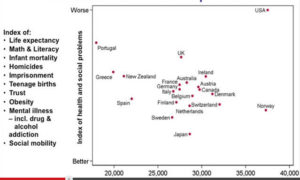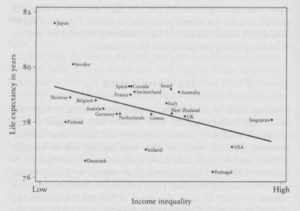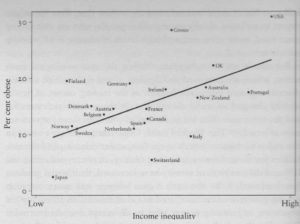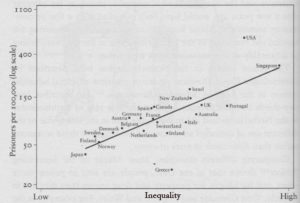 ARVIRAGUS Are we not brothers?
ARVIRAGUS Are we not brothers?
IMOGEN So man and man should be; But clay and clay differs in dignity, Whose dust is both alike.”
(Cymbeline, act 4, sc. 1)
“…Methinks I see my father”, says Hamlet. “Where my lord?” asks Horatio. “In my mind’s eye”, replies Hamlet.
And it is in our minds’ eye that, at times, we see flashes of truth on subjects we may not routinely think about. But our intuitions are often distant from our personal knowledge related to the matter and seem too vague to rely on them with conviction.
For example, it does not require special expertise or intuition to realize that social problems such as life expectancy, infant mortality, drug addiction, teenage pregnancy, violence, mental illness, prison population, social in-cohesion, obesity, school dropouts and others are affected by poverty.
Now, let’s exclude notorious areas of degradation in cities like Detroit, Chicago or St. Louis – heavily affected by the dislocation of manufacturing overseas.
Other cities may not have ghettos but they still have residential areas more affected by crime than others. Yet often, in looking at them, the visitor does not see signs of outward degradation. Some houses may be older, but there is green in the front yard, an orchard in the back and, here and there, touches of unostentatious elegance. The public housing facilities are modern, parks are within walking distance and schools are nearby.
In fact, some US residential areas affected by crime, compare favorably, at least in appearance, with non-crime areas in European cities, where people habitually live in apartment buildings 10-20 story high.
But then, if the outward signs of poverty are missing, what causes drug addiction, teenage pregnancy, violence, mental illness, more imprisonment, social lack of cohesion, obesity and school dropouts?
Some blame teachers, parents, lack of religion etc. – lame answers, much as saying that a great cause of the nigh is lack of the sun (As You Like It).
In our mind’s eye we sense that the cause may be something else rather than poverty. It may have to do with the structure of society and with its values instilled and absorbed by the population at large.
That maybe (or may have been) the limit of our mind’s eye’s vision on the subject. But a set of interesting recent statistics obtained by comparing parameters of social health (or sickness) in different countries have proven a remarkable truth.
The conclusion is that not poverty, but the degree of social inequality is an indicator and predictor of greater social problems. And that inequality affects even those who are not necessarily poor. The statistics exclude the tiny fraction of the 1% who live essentially in another world and are isolated from it.
 Take for example the chart showing the index of health and social problems versus the average income per head. As you can see, there is no relation between the two factors. But when we chart the index of health and social problems against inequality, a dramatically new picture emerges. The higher the
Take for example the chart showing the index of health and social problems versus the average income per head. As you can see, there is no relation between the two factors. But when we chart the index of health and social problems against inequality, a dramatically new picture emerges. The higher the  inequality (left to right on the x axis), the greater the index of social problems.
inequality (left to right on the x axis), the greater the index of social problems.
Someone may object that the index of health and social problems is arbitrary and therefore unreliable. If so, we may all agree that life expectancy, for example, is a reasonable index of societal health. Again, as you see in the chart, (graph below), the greater the inequality, the lower the life expectancy.
 The pattern is consistent for all the parameters, including for example, rate of imprisonment and obesity –two indexes that, on the surface seem quite unconnected.
The pattern is consistent for all the parameters, including for example, rate of imprisonment and obesity –two indexes that, on the surface seem quite unconnected.
Given the above, “there is much consonancy in the sequel” (from Twelfth Night). The greater the income inequality, the larger the problem. But, given that, when comparing countries with one another, poverty is relative and it does not equate with income inequality, why the extraordinary statistical results?
The answer is relatively simple. Inequality is socially corrosive. The social problems are responses to social status differentiations. For in industrialized societies, income is not important in itself except as a signal of social status.
Statistics show that at the early stages of economic development, the level of general happiness increases with income. But after reaching a certain level, the happiness index levels off and any further increase in the median income is purchased at a high cost in environmental degradation.
That is to say, economic growth as a transformer of the quality of life has finished its work. Politicians in the industrialized world who babble about “growth” – even if the promised “growth” were possible, which today is questionable – either do not know what they are talking about or assume that by promising “growth” they may be re-elected.
Inequality works itself deep into the fabric of society. For income is not so much important in itself but as an index of social status. Interestingly, politician and academics speak freely about poverty, but inequality, at least for their largest majority, seems a forbidden or embarrassing subject. In the circumstances silence equates to denial.
 Yet vast inequality effects everyone but the super-rich. It is divisive, it is corrosive and it is a social pollutant. The steeper the pyramid, the greater the importance of class and the quality of social relations. The steeper the social hierarchy, the bigger the social distances. People work longer hours but save less and get more into debt. The insecurity of status turns into fear of how we will be judged by others. And inequality becomes a very powerful way of telling people at the bottom that they are worth nothing.
Yet vast inequality effects everyone but the super-rich. It is divisive, it is corrosive and it is a social pollutant. The steeper the pyramid, the greater the importance of class and the quality of social relations. The steeper the social hierarchy, the bigger the social distances. People work longer hours but save less and get more into debt. The insecurity of status turns into fear of how we will be judged by others. And inequality becomes a very powerful way of telling people at the bottom that they are worth nothing.
These concerns dig deep into personal life and create neurotic responses, fear of inadequacy, social anxiety and a whole series of psychosocial problems. Most adults repress their fears or compensate for them with other personally damaging pursuits (for example overeating) or maybe drugs. Diabolically, prescription drugs against dysfunctional social reactions are the remedy of choice by the pharmaceutical industry. Which in turn further increases the range of inequality to which the original problems can be traced.
When, after various school massacres, it has been possible to track the motive of the killer, it has consistently been found to be hatred for having been put down, for not having been accepted or similar.
A point rarely discussed, is that the visible champions of inequality do not reflect at all, in what they say or do, the abilities entitling them to the enormous share of the commonwealth that they plunder for themselves. For example, the CEO of McDonald makes 1200 times more than those who prepare the food, who do not earn a living wage. A McDonald worker should work for 516 years before he makes what the CEO earns in one year.
The CEO’s response is that the affected workers should demand food vouchers from the government. That is the state, the taxpayers, the citizens should subsidize the organization responsible for the grotesque inequality made possible by the low wages paid the workers who keep the company in existence.
Or consider the CEO of General Motors who, paid millions per year and having worked in the company for 30 years, claims that a simple mechanical problem suspected to have cause hundreds of car deaths, was caused by the “culture” of the company. As if the “culture” were something affecting everyone else but herself.
Not to mention the philosophical argument by George W. Bush that people are richer because they are smarter. This, of course, would include the utterer of the sentence, a thought that has caused many jaws to drop in disbelief.
Some readers may argue that inequality has always existed and that bringing it now to the attention of the public is the discovery of warm water. This is not so, especially if we consider recent US history, since the birth of Reaganomics and the associated trickle down economics. A powerful (perhaps involuntary) metaphor of the biblical crumbs falling off the table of the rich and reaching Lazarus on the ground, thanks to gravitational down-trickling.
During the Cold War massive and relentless propaganda propagate the belief that liberty and equality are incompatible with each other. Life in the Soviet Union, as portrayed by the Western media seemed to show that loss of freedom would be the price to pay for greater equality.
In other words, the price of freedom is the abandonment of the equality incorporated into the Declaration of Independence. Of course, not everybody agrees or agreed. For Tom Payne, one of the key intellectual fathers of the American Revolution, there could be no liberty without equality. Slavery, denying both proved the point. Equality was (and is) the strongest protection against power and its abuses.
In contrast, the prevailing current philosophy is that that a so-called market economy and massive inequality go hand-in-hand with freedom. Market economy has dulled the sensibility as to what is or is not marketable. Examples are many and typical is the recent case involving the appointed state executioners in the Texas and Oklahoma prisons. The Oklahomans asked the Texans to send them lethal drugs to execute a prisoner in death row. Whereupon the Texans answered that they would do so if the Oklahomans would send in exchange a nu mber of tickets for an (American) football game
mber of tickets for an (American) football game
Statistics show that income inequality affects health, rate of imprisonment, obesity The reduction of extreme income differences during World War 2 in Britain resulted in a rapid improvement in health, and consequently in life expectancy. Similar conditions developed in Japan after WW2,  with demilitarization, distribution of wealth and power and dramatic improvements in population health.
with demilitarization, distribution of wealth and power and dramatic improvements in population health.
In contrast, Russia has experienced dramatic decreases in life expectancy since the early 1990, as the public resources were transferred to oligarchs, leading to dramatic income inequality.
More in general, the greater the income inequality, the harsher the chronic stress leading to proportionally unhealthy societies.
On the subject of inequality, most populations, including its leaders, seem to live in a hypnotic state. In silent accordance with the law of inequality, guardians and executors of domestic and foreign policies believe themselves to be indispensable and all others down the pyramid, dispensable. In the immortal words of Victoria Nuland, assistant secretary of state, specialized in CIA-driven regime changes, “Fuck the Europeans”.
“The tide of pomp that beats upon the high shore of the world” (King Henry V) is still beating. And the more it beats at the current rate, the more it destroys not only individuals but the planet.
Neo-liberal skeptics, even when presented with the results and the statistics, maintain that “it may seem so but it ain’t”. To them we say, “Nay, neo-liberals, it is, we know not ‘seems’. “ (Hamlet). Even though, at the moment, still, “The miserable have no other medicine but only hope.” (Measure for Measure).
In the play. Imogen escaped from the English Royal Court and her evil stepmother. Imogen is wearing a man’s disguise and has been quickly adopted by the two brothers Arviragus and Belarius as another brother.
Statistics obtained from “The Spirit Level” (Wilkinson & Pickett)
